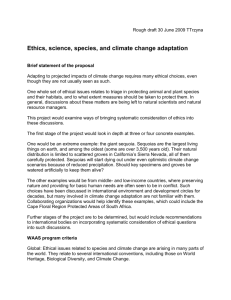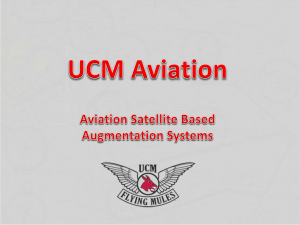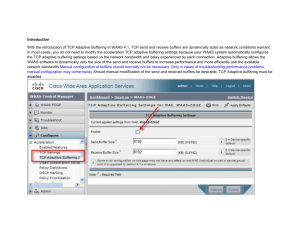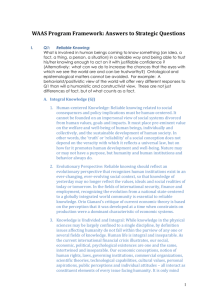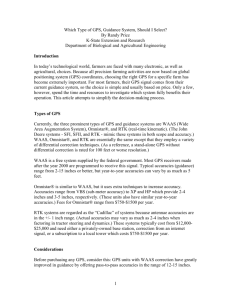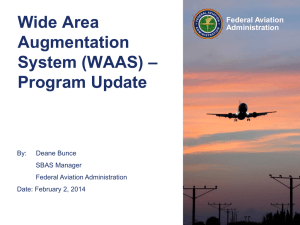IWG WAAS Status Brief 062513 - final
advertisement
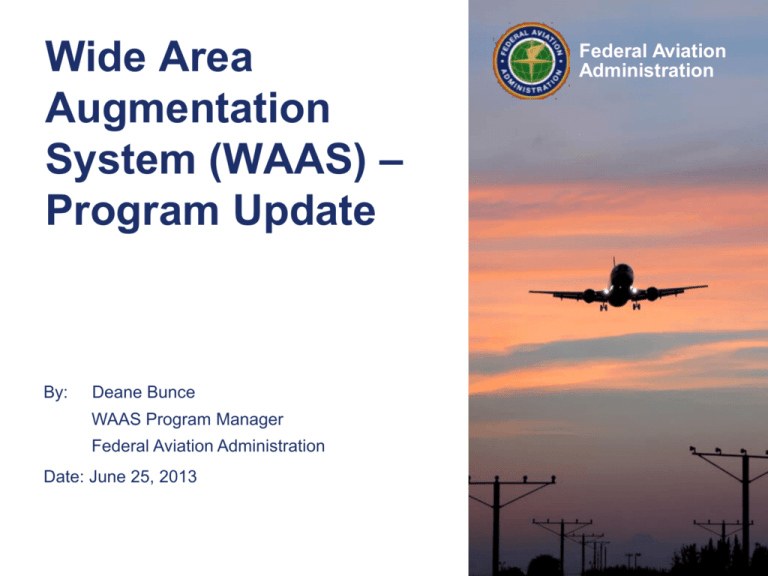
Wide Area Augmentation System (WAAS) – Program Update By: Deane Bunce WAAS Program Manager Federal Aviation Administration Date: June 25, 2013 Federal Aviation Administration Agenda • • • • WAAS Status WAAS Performance WAAS Future Plans User Segment Update WAAS Program Update – IWG 25 June 25, 2013 Federal Aviation Administration 2 Wide Area Augmentation System WAAS Program Update – IWG 25 June 25, 2013 38 Reference 3 Master 6 Ground Stations Stations Earth Stations 3 Geostationary 2 Operational Satellite Links Control Centers Federal Aviation Administration 3 WAAS Phases • Phase I: IOC (July 2003) Completed – Provided LNAV/VNAV/Limited LPV Capability • Phase II: Full LPV (FLP) (2003 – 2008) Completed – Improved LPV availability in CONUS and Alaska – Expanded WAAS coverage to Mexico and Canada • Phase III: Full LPV-200 Performance (2009 – 2013) – – – – • Development, modifications, and enhancements to include tech refresh Steady state operations and maintenance Transition to FAA performed 2nd level engineering support Begin GPS L5 transition activities Phase IV: Dual Frequency (L1,L5) Operations (2014 – 2028) – Complete WAAS transition from L2 to L5 – Commence dual-frequency, iono-free service • Improved availability and continuity, especially during severe solar activity – Maintain single frequency SBAS service – Other capabilities under consideration (see Technology Evolution slide) – Development will be completed in two segments WAAS Program Update – IWG 25 June 25, 2013 Federal Aviation Administration 4 WAAS Phase III Ground Segment Development • WAAS Release 1 Complete – PCU Upgrade • WAAS Release 2 Complete – Release 2A included integration of the AMR GEO in November 2010 – Release 2B upgraded routers in September 2011 – Release 2C upgraded PRN (Pseudorandom Noise) Mask Update in August 2011 • WAAS Release 3 – Release 3A implemented ionospheric robustness change in December 2011 – Release 3B included GUST Upgrades to improve reliability in September 2012 • WAAS Release 4 – Software Build Merge & Code Clean up • Build Merge completed in September 2012/ Code Clean-up completed January 2013 • System Testing completed in June 2013 • Cutover planned for September 2013 WAAS Program Update – IWG 25 June 25, 2013 Federal Aviation Administration 5 GEO Activities • Current WAAS GEO satellites – Intelsat Galaxy XV (CRW) – Anik F1R (CRE) – Inmarsat I4F3 (AMR) * • GEO 5/6 – SIR package released December 2011 – Contract awarded September 2012 * - AMR is a non-ranging satellite WAAS Program Update – IWG 25 June 25, 2013 Federal Aviation Administration 6 WAAS Coverage 2003 IOC – LPV Coverage in lower 48 states only 2008 Coverage - Full LPV 200 Coverage in CONUS (2 Satellites) WAAS Program Update – IWG 25 June 25, 2013 2013 Coverage - Full LPV 200 Coverage in CONUS (3 Satellites) Federal Aviation Administration 7 WAAS High Level Schedule Activities Dual Frequency Contract FAA Independent Activities CY 12 13 14 16 17 18 1/13 11/14 9/13 G-III Reference Receiver Development 9/14 8/15 Production Fielding Processor Upgrade 9/14 GEO 5 7/15 Safety Computer Integration C&V 7/18 GUST GUST C&V Complete Complete GEO 6 7/18 GEO 7 7/19 Stds. GPS Dual Frequency GPS L5 Constellation 20 System-Wide G-III Test Circuits MOPS Development 19 7/14 Safety Computer Development Communication Upgrades 15 Segment 2 Segment 1 12/18 Final Draft 12 SV 18 SV (IOC) 24 SV (FOC) Federal Register Notice • L1/L2 Sunset – In 2008 the Office of Space Commercialization produced a Federal Register Notice detailing the U.S. Government's plan to phase out codeless and semi-codeless [L2 P(Y)] access to GPS by 31 December 2020. – Concern with the elimination of L2 P(Y) signal prior to full implementation of new L5 signal WAAS Program Update – IWG 25 June 25, 2013 Federal Aviation Administration 9 Transition from L2 to L5 • The overall WAAS coverage in the Continental US if there is full GPS Service Availability (24+ Satellites) when the US transitions from L2 to L5 • The overall WAAS coverage in the Continental US if GPS Service Availability is reduced to 21 Satellites prior to full transition to L5 LPV WAAS Program Update – IWG 25 June 25, 2013 LPV-200 Federal Aviation Administration 10 Future LPV-200 Coverage(Dual Frequency GPS) WAAS EGNOS MSAS WAAS Program Update – IWG 25 June 25, 2013 Federal Aviation Administration 11 WAAS Dual Frequency Operations • ‘Sunset’ of L2 P(Y) compels WAAS to utilize another signal to maintain current service – USG Federal Register Notice states ‘sunset’ for L2 P(Y) signal use in December 2020 • • New dual frequency L1/L5 service needed to further improve WAAS availability and continuity Segment 1 – Develop infrastructure improvements to support use of L5 • 5 to 7 year effort – G-III Reference Receiver Integration, Communications Upgrade, Safety Computer Integration • Segment 2 – Implementation of L1/L5 user capability • 5 to 7 year effort • Dual Frequency Messaging • GEO sustainment will occur during both segments – Maintain minimum of dual coverage over WAAS service area WAAS Program Update – IWG 25 June 25, 2013 Federal Aviation Administration 12 WAAS Reference Receiver (G-III) • WAAS program developing next generation reference receiver (G-III) • G-III receiver will add significant new capability and support WAAS dual frequency upgrades in 2014 – 2019 timeframe – Tracks up to 18 GPS satellites and 8 SBAS satellites – Capable of tracking GPS L1C/A, L1C, L2C, L2 P(Y), and L5 signal types – Expandable to support additional GNSS signals in the future • Current Status – Software Development and Hardware Development Completed – Acceptance of ~14 Production Receivers expected June 2013 • Follow-on contract for production receivers expected 4th Qtr FY13 – ~165 Production Receivers WAAS Program Update – IWG 25 June 25, 2013 Federal Aviation Administration 13 WAAS Safety Computer • The SC adds significant new capability and support to WAAS dual frequency upgrades – Will support hosting of either WAAS Master Station (WMS) application or GEO Uplink Station (GUS) without changing the WAAS SC hardware or Infrastructure software • WMS type SCs – Validates corrections generated by DO-178B Level D assured software (WMS Correction Processors (CPs)) – Precludes broadcast of Hazardously Misleading Information (HMI) to WAAS users • Current Status – Preliminary Design Review completed September 2012 – Critical Design Review, December 2012 – Unit Testing initiated June 2013 • Initial Production currently scheduled to complete in FY2013 •SC Conceptual Design: Rearview – ~28 Production Safety Computers • Follow-on contract for full production of SC in 2014 WAAS Program Update – IWG 25 June 25, 2013 Federal Aviation Administration 14 WAAS Communications Upgrade and Dual Frequency Capability • WAAS Communication – Supports additional bandwidth and data associated with Dual-frequency WAAS – Network router technology refresh – Execution by WAAS Operations Team • Dual-Frequency Capability – L1/L5 User capability vs. Multi-constellation – Program focus is L1/L5 with minimizing changes – Continuing organic algorithm development • Established algorithm subgroup process plan – Three categories established (legacy, legacy/dual-freq, dual-freq) – Prototype through WIPP approval • Establish cost/benefit for proposed enhacements – Multi-constellation work being conducted in parallel – Supporting development of definition document (IWG) • Basis for interface design and MOPS development WAAS Program Update – IWG 25 June 25, 2013 Federal Aviation Administration 15 WAAS Technology Evolution • Multi-constellation – Minimal effort conducted in last 6 months – Supporting ICAO job card efforts • Advanced RAIM (ARAIM) – Avionics-centric approach to dual-frequency multi-constellation – ARAIM subgroup developing more detailed concept definition • Will be used to coordinate standards development with ICAO, RTCA and EUROCAE • South America Expansion – No recent efforts or discussions • APNT – Review of alternatives / backup when GNSS is unavailable • Safe landing, not necessarily to intended destination WAAS Program Update – IWG 25 June 25, 2013 Federal Aviation Administration 16 Airports with WAAS LPV/LP Instrument Approaches As of May 30th, 2013 - 3,544 LP/LPVs combined - 3,123 LPVs serving 1,563 Airports - 806 LPV-200’s - 2,046 LPVs to Non-ILS Runways - 1,077 LPVs to ILS runways - 1,379 LPVs to Non-ILS Airports - 421 LPs serving 306 Airports - 418 LPs to Non-ILS Runway - 3 LPs to ILS Runways WAAS Program Update – IWG 25 June 25, 2013 Federal Aviation Administration 17 WAAS STC Aircraft May 2013 (Estimate) • Garmin – 61,873 aircraft – – Covers most GA Part 23 aircraft. See FAA Garmin Approved Model List (AML) • http://rgl.faa.gov/Regulatory_and_Guidance_Library/rgstc.nsf/ • Universal Avionics – 1,791 aircraft – – 122 fixed wing and 12 helicopter types and models Airframes to include (Boeing, de Havilland, Dassault, Bombardier, Gulfstream, Lear, Bell, Sikorsky, etc…) • Rockwell Collins – 1290 aircraft – – – 36 types and models Airframes to include (Beechjet, Bombardier, Challenger, Citation, Dassault, Gulfstream, Hawker, KingAir, Lear) Airbus 350 certification pending • Honeywell – 450 aircraft – – 19 types and models Airframes to include (Gulfstream, Challenger, Dassault, Hawker, Pilatus, Viking) • Avidyne – 190 aircraft – – 3 types and models (Cirrus, Piper Matrix, and EA-500) 300 IFD 540 WAAS LPV units pre-sold (STC Pending – June 2013) • Innovative Solutions & Support (IS&S) – 200 aircraft – – Eclipse 550/500 Boeing 737-400 (Pending) • Cobham (Chelton) – 247 aircraft – Multiple types and models (Bell-407, Bell -412, Cessna 501, 550, Eurocopter AS-350, Piper PA-42, Beechcraft C-90&A, Agusta AW109SP) WAAS Program Update – IWG 25 June 25, 2013 Federal Aviation Administration 18 Recently Completed Program Activities Outreach Initiatives • Northern Air Cargo: Equipped three B-737s with Universal Avionics UNS-1Fw WAAS FMSs – Benefits • STC for first US-owned WAAS-equipped Boeing aircraft (B-737/200) • STC applicability to over 1800 A/C world wide • Validate Alaska WAAS GEO availability, pre- and post-GEO outage • Bell Helicopters: Bell-429 helicopter equipped and Bell Project completed with route structure and point-in-space instrument approach procedures successfully demonstrated. PinS design criteria documentation submitted to FAA AFS-400 – Benefits • WAAS enabled LPV PinS approach procedures, developed by ‘private applicator’ – shown to provide substantially lower minima • Unique opportunity to Quantify benefits for WAAS serving as primary means of navigation – Bell Helicopter serves major law enforcement and EMS operators – Alternate airport/heliport landing area issues • CapeAir: Equipped six Cessna 402C aircraft with Garmin GNS-430W receivers – Cape Air made the business decision to equip their entire fleet of 64 aircraft with WAAS LPV avionics – Realized enhanced vertical guidance into remote airports that might not otherwise be serviced in low instrument meteorological conditions (IMC). – Greatly enhanced safety, especially in high terrain areas where missed approach procedures are precarious – Additional wake turbulence avoidance procedure test completed (3.5 degree glide path angle) • Care Flight: Completed STC and Flight Validation for August A-109E with Garmin 430W – Program flight operations completed for hospital LPVs and non-interfering routes around DFW • FAA Citations: Equipped two aircraft with Universal UNS-1Fw FMSs. Project Complete WAAS Program Update – IWG 25 June 25, 2013 Federal Aviation Administration 19 Current Program Activities - Outreach Initiatives • Horizon WAAS Data Collection: Initial project equipped seven Q-400 aircraft with Universal WAAS flight management systems. Substantial benefits realized, Horizon entire fleet of 50 Q400s now fully equipped: – Lower Minimums with LPV approach, Precision Vertical Guidance, Primary Means Navigation, RAIM Prediction Requirements, Best Alternative when ILS is OTS, Platform for RNP, Reduction of Track Miles, Decommission NDB Approaches, and VOR Approaches reducing crew training requirements and expense, best combination for PBN approach RNP / LPV / RNP • Horizon Low Visibility Approach: Test and simulate low visibility approach operations with Head-Up Guidance System and WAAS LPV to reduce Decision Height and Runway Visual Range. Goal is 150 DH with 1400 RVR: – 320 Simulation runs and 35 actual flight tests planned for data collection – Test plan has been submitted to AFS400 for approval • Express Jet (formerly ASA): Equip 4 Canadair Regional Jet 900 (CRJ900) aircraft with Rockwell/Collins WAAS/LPV enabled GPS4000S avionics – Phase 1: CVNAV Service Bulletin installs completed on April 8, 2013 – Phase 2: WAAS/LPV STC installs expected to be completed by October 2013 WAAS Program Update – IWG 25 June 25, 2013 Federal Aviation Administration 20 Current Program Activities Outreach Initiatives (Cont.) • NetJets: Equipped 10 Hawker 900XP aircraft with Rockwell Collins FMS and Integral WAAS GPS receiver. All NetJets’ new aircraft are ordered with WAAS LPV capability – WAAS data collection is completed. 9,213 flights occurred with 322,455 WAAS data sets collected. Final report due May 31, 2013 • Garmin Radius-to-Fix (RF) Project: – Collected data to determine whether installation guidance could be revised to allow hand flown Radius to Fix RF turns to existing criteria on required navigation performance (RNP) for public use RNAV wide area augmentation system (WAAS) approaches – Determined instrument-rated GA pilots could hand fly RF legs while meeting a 0.5 nm 95% FTE target and RF leg altitude restrictions in two Part 23 Category A and B aircraft equipped with Garmin GPS/SBAS panel mount & integrated flight deck equipment. – Conducted approaches without the use of Autopilot (AP) and/or Flight Director (FD) with subject pilots from about 90 KTAS to 200 KTAS with the FTE’s well within bounds – Update to Technical Standing Order (TSO) and amendment of STCs for Garmin GTN 600/700 and G1000 GPS/WAAS navigation equipment to add RF Turn capability. Work in progress • Associated Aircraft Group (AAG): Two Sikorsky helicopters equipped with Universal UNS-1Fw FMS – Conducting IFR helicopter procedures and routing in the complex New York airspace. South shore noninterfering routes flight tested by FAA Tech Center • FAA Tech Center Convair Project: – Convair 580 WAAS Beta 3/ADS-B Out STC issued – Amended STC WAAS Delta 4/LPV/LP and ADS-B Out certification expected by September 2013 WAAS Program Update – IWG 25 June 25, 2013 Federal Aviation Administration 21 Questions WAAS Program Update – IWG 25 June 25, 2013 Federal Aviation Administration 22 • • • • • • WAAS Avionics Status Garmin: – 83,173+ WAAS LPV receivers sold – Currently largest GA panel mount WAAS Avionics supplier – New 650/750 WAAS capable units brought to market at the end of March 2011 to replace 430/530W units AVIDYNE & Bendix-King: – 190 Avidyne Release 9 units sold to date. Introduced IFD540 FMS/GPS/Nav/Com System with Touch screen – Bendix King KSN-770 certification pending Universal Avionics: – Full line of UNS-1Fw Flight Management Systems (FMS) achieved avionics approval Technical Standards Orders Authorization (TSOA) in 2007/2008 – 2,987+ WAAS receivers sold as of March 12, 2013 Rockwell Collins: – Approximately 2,700 WAAS/SBAS units sold to date CMC Electronics: – Achieved Technical Standards Orders Authorization (TSOA) certification on their 5024 and 3024 WAAS Sensors – Convair aircraft have WAAS LPV capable units installed (red label) and received WAAS LPV certification November 2012 – Canadian North B-737-300 obtained STC for SBAS(WAAS) LPV using dual GLSSU-5024 receivers Honeywell: – – • Primus Epic “PlaneView” and “SmartView” avionics suites. Primus 2000 w/FMZ- 2000, 6.1 FMS with CMA 4124 sensors Innovative Solutions & Support: 200 integrated systems WAAS Program Update – IWG 25 June 25, 2013 Federal Aviation Administration 23
